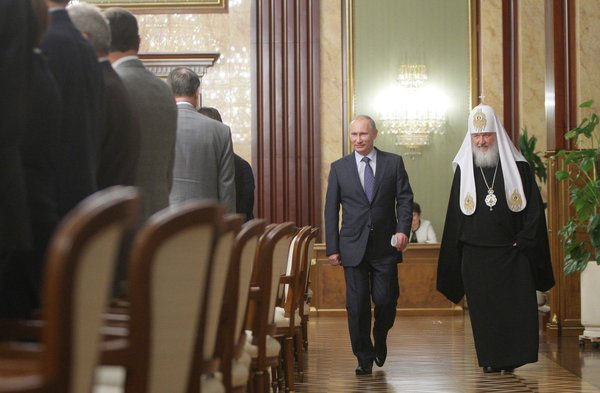By Irina Papkova
The Russian Duma elections of December, 2011 contained many surprises, starting of course with the nature of the public reaction. On the eve of the election, almost no one anticipated that blatant falsification of electoral results would spark not just widespread indignation but also the largest mass protests the Russian Federation has seen since the early 1990s. Still less did anyone predict that prominent members of the Russian Orthodox Church (ROC) would add their voices to the social upheaval. For the larger part of the last decade, the ROC had garnered the reputation of an institution closely linked to the upper echelons of power. This image was cemented by frequent joint appearances by high-ranking bishops and politicians, most strikingly exemplified by the role played by the Patriarch in the presidential inauguration ceremonies.
The perception of a church-state ideological juggernaut began to rapidly intensify in 2009, with the election of Kirill I (Gundiaev) to the post of patriarch. His predecessor, Aleksii II (Ridiger), had carefully cultivated an image of a religious leader above the political fray, and had in general steered a course meant to position the ROC as the most powerful social institution in the Russian Federation without necessarily transforming it into a virtual political party. Aleksii died in December 2008 and was replaced by Kirill, who was already well known as a public figure in Russia because of his long tenure as the head of the ROC’s Department of External Affairs. As patriarch, Kirill has waged a campaign to intensify what he calls the ROC’s “mission” in Russian society, through a strategy that has included among other things intense lobbying for legislation favorable to the ROC’s interests, constructing new churches, raising the profile of the church in the media, and fostering active religious mission at such untraditional venues as rock concerts and motorcycle rallies. This has had three results. First, the state has recently passed legislation allowing the institution of chaplaincies in the Russian army, as well as legalizing a religious component to public school education and (potentially most importantly) authorizing the restitution of church property seized by the communist state after 1917. Second, the ROC’s profile in Russian media has risen considerably since 2009. Third, taken together, these ostensibly positive results for the ROC have combined to create the public impression of a church more and more tightly tied to the government. As such, the expectation in the run up to the elections was that if the governing “party of swindlers and thieves” was going to falsify the election, the Church would stand idly by and give its silent blessing to the thievery.
This is why the actual reaction of the Church proved quite interesting–even shocking. The reaction proceeded in stages. Initially, the voices of protesters were joined by lower ranking clergy, some of whom had actually participated as electoral monitors and had witnessed falsification of results first hand. Yet the lower clergy was not unanimous in its indignation. On the one hand, the mainstream Orthodox website Pravmir.ru published numerous statements by priests condemning the falsifications. At the same time, the most popular Orthodox website, Pravoslavie.ru, maintained complete silence on the matter – easily explained by the fact that Pravoslavie.ru is housed at Sretenski monastery in Moscow, whose abbot was once widely rumored to be the spiritual advisor of Vladimir Putin. Still, the fact that some priests were publicly siding with the protesters was noticed in the social media, which for example posted and reposted an article written by Father Dmitry Sverdlov about his experience monitoring a polling station in Moscow (available here in Russian only). At the same time, the higher clergy remained silent; most significantly, the patriarch himself did not speak about the elections for ten days after they had occurred. When he did finally break his silence, his sermon was ambiguous, calling upon the populace to maintain calm but at the same time calling upon the government to revisit its corrupt practices. Over time, Kirill’s reaction has become stronger – at the end of January, he invited Vladimir Putin and Dmitry Medvedev for a meeting at the Cathedral of Christ the Savior in Moscow to “discuss a correction of his political course.” This can be read only as the patriarch offering to mediate between an increasingly discontented electorate and a visibly shaken political class. The reasons for Kirill’s increasing willingness to be openly critical of the regime may be explored in a later post; for now, it suffices to say that once again, Russian politics have proved full of surprises, and that all attempts at predicting what happens next must deal with Russia’s inherent unpredictability, even in the sphere of church-state relations.
Irina Papkova is Assistant Professor of International Relations and European Studies at Central European University. She received her Ph.D. from the Government Department of Georgetown University and has previously taught at Georgetown and George Washington Universities. Her book, “The Orthodox Church and Russian Politics,” was published by Oxford University Press and Woodrow Wilson Center Press in 2011.
This is the first in a Revealer/Luce Foundation series on Russia. Look for our review of Irina’s book next month!

